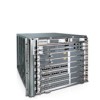Dell Force10 E300 Installing and Maintaining the E300 System - Page 11
E300 System Installation Process, Appendix, A, System Boot, - air flow
 |
View all Dell Force10 E300 manuals
Add to My Manuals
Save this manual to your list of manuals |
Page 11 highlights
Table 2-1. E300 Component Requirements Component Backplane (factory installed) Air filter Fan tray RPMs Line cards SFMs Power Supplies: AC Power Supply (100 - 120 VAC) AC Power Supply (200 - 240 VAC) DC Power Entry Module (PEM) Cable management bracket Minimum 1 1 1 1 1 1* 3 2 1 0 *With one SFM, the E300 does not transmit traffic at line rate. Maximum 1 1 1 2 6 2 4 4 2 2 Field-Replaceable? No Yes Yes Yes Yes Yes Yes Yes Yes Yes E300 System Installation Process To install the E300 System, Dell Force10 recommends that you install the chassis and modules in the following order: Step 1 2 3 Task Prepare the Site Unpack the chassis and components Mount the chassis 4 Install components: • Fan Tray • AC Power Supply or DC PEMs 5 Verify power supplies and air flow 6 Install RPMs, line cards, and SFMs 7 Connect network cables 8 Supply power to the Chassis Relevant Section in the Manual Site Selection Criteria on page 13 Storing Components on page 16 Installing the Chassis into an Equipment Rack on page 17 or Installing the Chassis into an Equipment Cabinet on page 18 Installing E300 Fan Tray on page 29 Installing Power Modules on page 19 Power Supply and Fan Operability Test on page 27 Installing RPMs, Line Cards, and SFMs on page 31 RPM Ports and Cables on page 39 Powering Up on page 43 After you supply power to the chassis, the software boots to the run-time CLI prompt. To interrupt the boot process, enter the break key sequence (CNTL-SHIFT-6) and enter the BOOT_USER mode. Refer to Appendix A, System Boot, on page 51 for more information on the BOOT_USER mode. The E300 System | 11















